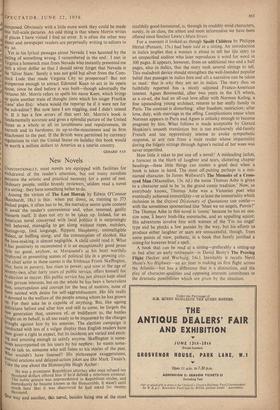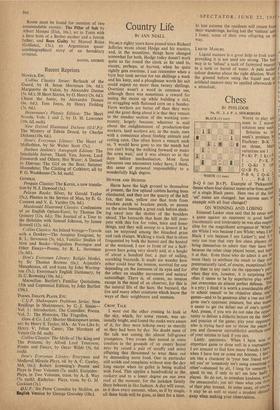New Novels
UNINTENTIONALLY, most novels are equipped with facilities for withdrawal of the reader's attention, but not many novelists Perceive the artistic and practical necessity for a point of rest. Ordinary people, unlike broody reviewers,' seldom read a novel et a sitting : they have something better to do.
Among the virtues of The Last Hurrah by Edwjn O'Connor (Reinhardt, 18s.) is this : when put down, as, running to 373 Packed pages, it often has to be, the narrative seems quite content to await the reader's convenience and, when resumed, gently reasserts itself. It does not cry to be taken up. Indeed, for an American novel concerned with local politics it is surprisingly well behaved, managth to get along without rapes, mterders, beatings-up, foul language, flippant blasphemy, unintelligible boc1ect, or baffling slang; and the consumption of alcohol, like the love-making, is almost negligible. A child could read it. What It has positively to recommend it is an exceptionally good prose style (as good, anyhow, as Marquand's at his best) worthily employed in presenting scenes of political life in a growing city. the chief actor in these scenes is the Irishman Frank Skeffington, who, born in poverty, has risen to power, and now at the age of seventy-two, after forty years of public service, offers himself for re. iection as mayor. His public service has not always kept aloof from private interests, but on the whole he has been a benevolent boss, unscrupulous and corrupt for the best of motives, none of them tainted with desire for self-aggrandisement. His life really 's devoted to the welfare of the people among whom he has grown UP. For their sake he is capable of anything. But, like ageing Politicians before and after him and still to come, he forgets the new generation that, unaware of, or indifferent to, the battles fought on its behalf, is all too ready to be impressed by the charges brought against him by his enemies. The election campaign is conducted with less of a vulgar display than English readers have b eel') given' a right to expect, but its incidents are varied and excit- ing and amusing enough to satisfy anyone. Skeffington is some- as accompanied on his tours by his nephew : he wants some- one to talk to, someone who will listen to his stories of the past.
0 wouldn't have listened? His picturesque exaggerations, ironical orations and delayed-action jokes are like Mark Twain's. Take the one about the Honourable Hugh Archer : He was a prominent Republican attorney who once refused ten thousand dollars offered him if he'd defend a notorious criminal. The noble gesture was unprecedented in Republican circles, and immediately he became known as the Honourable. It wasn't until much later that it was discovered he had asked for twenty thousand. On way and another, this novel, besides being one of the most stealthily good-humoured, is, through its credibly vivid characters, surely, in its class, the ablest and most informative we have been offered since Sinclair Lewis's Main Street.
For a moment it looked as though Spoilt Children by Philippe Heriat (Putnam, 15s.) had been told at a sitting. An introduction in italics implies that a woman is about to tell her life story to an unspecified auditor who later reproduces it word for word in 300 pages. It appears, however, from an additional two and a half pages, also in italics, that the story took several sittings to tell. This maladroit device should strengthen the well-founded popular belief that passages in italics fore and aft a narrative can be taken as read: that is why they are set in italics. The story thus so faithfully reported has a nicely adjusted Franco-American interest. Agnes Boussardel, after two years in the US where, as a co-ed, she had an all-out love affair with Norman Kellog, a fine upstanding young architect, returns to her stuffy family in Paris. The contrast is disturbing : after freedom, restriction; after love, duty, with marriage in the offing. Complications ensue when Norman appears in Paris and Agnes is unlucky enough to become pregnant by him. What follows is made acceptable by Gerard Hopkins's smooth translation but is too exclusively old-family French and too oppressively intense to evoke sympathetic response, at any rate from a male reader whose impartiality during the fidgety sittings through Agnes's recital of her woes was never imperilled.
How little it takes to put one off a novel! A misleading jacket, a forecast in the blurb of laughter and tears, cluttering chapter headings—these little things can matter a good deal when a book is taken in hand. The most off-putting perhaps is a mis- named character. In James Wellward's The Memoirs of a Cross- eyed Man (Macmillan, 13s. 6d.) the name Thomas Ashe is given to a character said to be 'in the grand comic tradition.' Now, as everybody knows, Thomas Ashe was a Victorian poet who eventually achieved immortality—or at least the immortality which inclusion in the, Oxford Dictionary of Quotations can confer— with the sometimes spoonerised line 'Meet we no angels, Pansie?' The Thomas Ashe in this novel is 'comic' because he has an out- size nose, fi heavy bush-like moustache, and an appalling squint. His adventures involve him with women of the 'I'm no angel' type and he plucks a few pansies by the way, but his efforts to produce either laughter or tears are unsuccessful, though, from some points of view, pathetic, in a book that barely justified a sitting for however brief a spell.
A book that can be read at a sitting—preferably a sitting-up in bed after an early retirement—is David Beaty's The Proving Flight (Seeker and Warburg, 14s.). Inevitably it recalls Nevil Shute's No Highway—an air liner is making its first flight across the Atlantic—but has a difference that is a distinction, and the play of character-qualities and opposing interests contributes to the dramatic possibilities which are given by the situation.
Room must be found for mention of two commendable exotics: The Pillar of Salt by Albert Memmi (Elek, 16s.), set in Tunis with a hero born of a Berber mother and a Jewish father; and Born Guilty by Manuel Rojas (Gollancz, 15s.), an Argentinian quasi- autobiographical story of an hereditary criminal.
DANIEL GEORGE



































 Previous page
Previous page